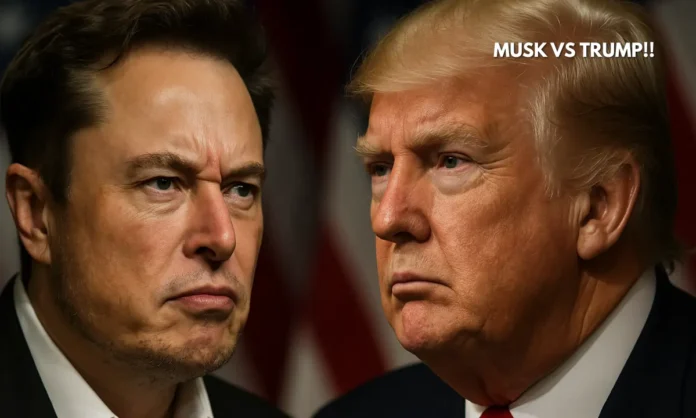SUMMARY
- Elon Musk says he’s “tempted to escalate” after Trump threatens deportation over spending bill criticism.
- Trump targets Musk’s U.S. citizenship and federal contracts, accusing him of betraying their political alliance.
- Fallout could reshape GOP loyalties, billionaire-backed influence, and tech–state power dynamics.
A Collision of Egos with National Stakes
The political clash between Elon Musk and Donald Trump has veered from a disagreement over fiscal policy to something far more personal—and potentially seismic for America’s power structure. In a startling turn, Trump threatened to deport Musk, strip federal funding from his companies, and reignite the political machinery that once elevated the billionaire to the top ranks of Republican influence.
What began as Musk’s critique of the “One Big Beautiful Bill”—a sweeping spending package championed by Trump—has now ballooned into a fight over citizenship, federal contracts, and the boundaries of political retaliation. Musk, once the tech face of Trump’s administrative efficiency push, now stands publicly at odds with the president he helped re-elect.
In a late-night post, Musk responded to a video of Trump’s threats with a single, cryptic statement: “So tempting to escalate this. So, so tempting. But I will refrain for now.” For a man known for acting on impulse, it was both a warning and a pause. But the subtext is clear: Musk is not done.
*JUST IN: Elon Musk responds to President Trump, stating moments ago his administration will “take a look” at deporting the billionaire.*
— Israel Now (@neveragainlive1) July 1, 2025
Musk wrote on 𝕏: “So tempting to escalate this. So, so tempting. But I will refrain for now.” pic.twitter.com/eBScrx4CHu
Trump’s Retaliation Playbook: Citizenship, Contracts, and Symbolism
- Trump hinted Musk could be deported, referencing his South African roots despite Musk’s U.S. citizenship since 2002.
- Suggested federal funds and contracts to SpaceX and Starlink could be reconsidered.
- Labeled Musk’s critique as selfish, tied to cutbacks in EV subsidies.
Trump’s vengeance was not subtle. Speaking to reporters en route to the opening of a Florida migrant detention center nicknamed “Alligator Alcatraz,” Trump said he would “have to take a look” at Musk’s citizenship status. Though Musk is a naturalized U.S. citizen, the symbolism of the threat echoed broader themes in Trump’s anti-immigrant rhetoric—this time aimed at a billionaire ally.
He didn’t stop there. Trump also mused about withdrawing government contracts from SpaceX and Starlink—companies that are not only critical to U.S. space infrastructure but also to geopolitical dominance in satellite communication. “We might have to put DOGE on Elon,” he said, invoking the Department of Government Efficiency (DOGE), the Musk-led bureaucratic unit that Trump created but which Musk left in May.
The tone was clear: Musk has crossed a line, and Trump intends to remind him who still wields the state’s levers of power.
From Allies to Adversaries: The Collapse of the DOGE Pact
- Musk once led Trump’s Department of Government Efficiency, strengthening their alliance.
- Musk’s departure from DOGE in May marked a turning point, after which he publicly criticized Trump’s spending spree.
- The rift widened as Musk floated a new centrist party and backed libertarian-leaning Rep. Thomas Massie.
The rapid unraveling of the Trump-Musk alliance was months in the making. Their relationship began with mutual benefit: Musk gained influence within federal circles, while Trump capitalized on Musk’s wealth and reach. But it began to sour when Musk objected to the fiscal excesses of Trump’s “One Big Beautiful Bill,” which he called a capitulation to Big Oil and a betrayal of conservative promises to cut government spending.
Trump’s bill removed several provisions favorable to the EV sector, including tax breaks and subsidies Musk’s companies once leveraged. In response, Musk accused Republican lawmakers of selling out and even promised to campaign against them in their primaries.
Behind the scenes, sources suggest Musk’s flirtation with launching the “America Party”—a centrist political alternative—fueled Trump’s anger. His endorsement of Rep. Thomas Massie, who voted against the bill and opposed Trump’s Iran military actions, drove the final wedge between them.
A Dangerous Precedent: Can the State Punish Political Dissent?
- Threats of deportation for political criticism raise serious constitutional and legal concerns.
- Musk’s case—if acted on—could set a precedent for retaliation against political donors or dissenting allies.
- Billionaire influence vs executive power now takes center stage in U.S. political discourse.
Trump’s suggestion that Musk could be deported—even in jest—is not just rhetorical overreach. It sends a chilling message: political allegiance, even at the highest levels of wealth and influence, is conditional and revocable. While it’s legally impossible to revoke citizenship from a naturalized American without due process, the very idea raises red flags about abuse of executive power.
More troubling is the implication that dissent—even from insiders—might provoke government retribution through bureaucratic or financial means. If federal contracts become tools of political loyalty rather than public service, the consequences will reach far beyond Elon Musk.
Already, Trump’s remarks have sparked backlash from legal scholars and political observers who warn of “soft authoritarianism” creeping into American governance. “This is not just about Musk,” one constitutional law professor said. “It’s about weaponizing the state against any dissent.”
Final Launch Trajectory: Collision Course or Strategic Retreat?
The showdown between Trump and Musk is far from over. Both men understand media spectacle, base loyalty, and personal branding better than almost anyone in their respective spheres. Yet the stakes here go well beyond Twitter drama.
Musk is armed with money, platforms, and public goodwill. Trump commands political machinery, populist energy, and institutional leverage. The next move will determine not just the outcome of their feud, but also the future of America’s fragile balance between capital and state.
For now, Musk says he’ll “refrain.” But the silence won’t last. And when the next escalation arrives, it may come with lawsuits, leaked documents, or the founding of a political party. Either way, one truth holds: this is no longer just a spat—it’s a tectonic crack in America’s political elite.


